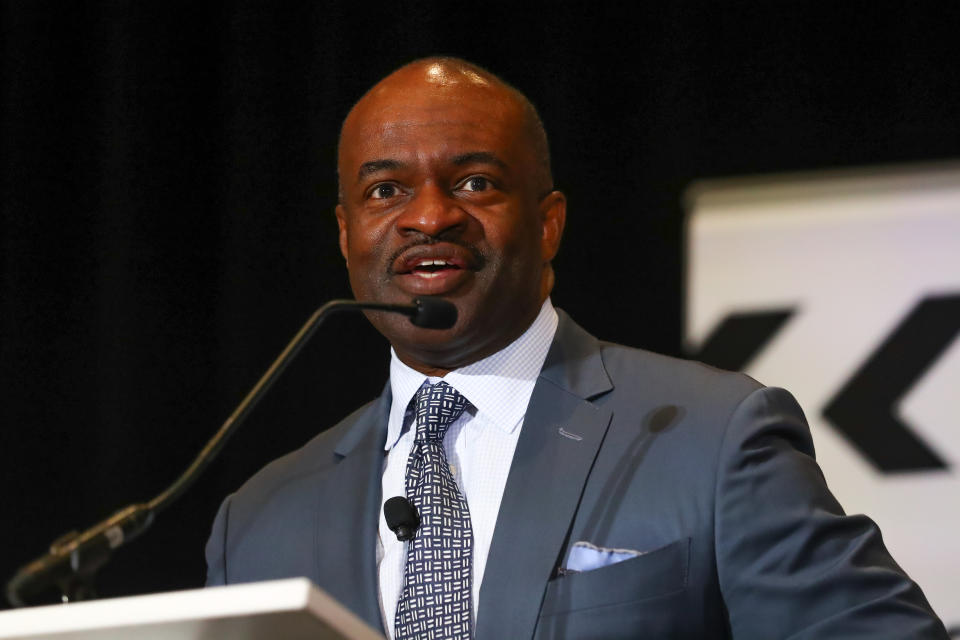NFL players vote to ratify new CBA, extending labor peace through 2030
In one of the most hotly contested votes in the history of the NFL player’s union, a collective bargaining agreement promising labor peace through 2030 has been approved by the league’s players.
A total of 1,978 players voted and the CBA passed 1,019-959 — or by 60 votes, what amounts to roughly one NFL team’s roster and practice squad.
“We are pleased that the players have voted to ratify the proposed new CBA, which will provide substantial benefits to all current and retired players, increase jobs, ensure continued progress on player safety, and give our fans more and better football,” commissioner Roger Goodell said in a statement. “We appreciate the tireless efforts of the members of the Management Council Executive Committee and the NFLPA leadership, both of whom devoted nearly a year to detailed, good faith negotiations to reach this comprehensive, transformative agreement.”
The passage comes after weeks of sometimes fierce debate among NFL stars and other rank-and-file players, many of whom stood to gain different benefits from a deal that took nearly 10 months to negotiate. The broad headline of the deal will be in how it ultimately changes the league’s schedule, which will now expand to 17 regular-season games as early as the 2021 season and add two additional playoff teams. The agreement also paves the way for the league to begin locking down new television deals in the coming weeks and months, albeit under a cloud of coronavirus uncertainty that could trigger significant economic ripples in the future.
But those headwinds will now be the NFL’s problem, now that the league and networks are guaranteed there will be no labor stoppages through the 2030 season. NFL players passed the deal on Saturday night, following a rollicking 10-day window that not only saw players and their legal advisers argue about the merits of this CBA, but also witnessed soon-to-be Carolina Panthers offensive tackle Russell Okung filing a National Labor Relations complaint against union executive director DeMaurice Smith in the middle of the vote, alleging Smith negotiated with team owners in bad faith by obscuring details about the talks from the union’s executive committee members.

That complaint will unfold in the coming months, but it came too late to halt the CBA’s approval by players — which still seemed uncertain right into Saturday night’s deadline. Despite the vast majority of the terms of the deal being negotiated by owners and union officials, a number of high-profile players took to social media and other outlets while venting displeasure with several significant agreements in the pact. Two in particular had many players questioning the quality of the deal: the expansion of the regular season to 17 games, and a revenue split that could top out at only 48.5 percent if all the applicable kickers were achieved. But other aspects of the deal apparently carried the vote amongst the rank-and-file players, with attractive incentives including an improvement of benefits, rise in minimum salaries and entry into the league’s pension plan after only three seasons.
Overall, the deal appeared to divide the players into two islands, including the elite-level players who won’t see the lion’s share of the deal’s upside and the middle and lower end of the pay scale, which count the benefits, pension packages and added game check as more of an earning incentive. A multitude of higher-paid players spoke out against the deal while also criticizing the union in the process.
The voices were apparently effective enough to create some doubt about the outcome over the course of the 10-day voting window. While the union leadership appeared to have some momentum to get the deal passed early in the process, it became less certain as more votes came in. So much so that the union continued to call for any outstanding votes right into Saturday, leaving some to question whether the measure might be on the verge of failure. After an early spate of voting in the first four days, some players asked if they could flip their vote, but the player reps from the league’s 32 teams voted to decline such a change.
The deal may have caught a tailwind late in the week among the NFL players who had not yet voted, with the spread of the coronavirus wreaking havoc on the stock market and creating uncertain economic conditions heading into the fall election season. With that in mind, players who were unsure about the quality of the deal given the previously high-flying economy may have been given some food for thought as it pertained to possibly going back to the bargaining table in a recession in 2021.
In the immediacy of the deal’s passing, it creates some decisions for NFL teams that were in line to use both the franchise tag and transition tag this offseason to limit the movement of free agents. The passage of the new labor agreement limits teams to using only one of those tags. That’s significant for a team like the Dallas Cowboys, which was believed to be weighing using the franchise tag on quarterback Dak Prescott and the transition tag on wideout Amari Cooper if the CBA failed. Now the Cowboys are expected to use the franchise tag on Prescott, allowing Cooper to test the free agent market.
The tagging deadline was extended to 11:59 a.m. ET on Monday for the specific purpose of determining how may tags would be available following Saturday night’s voting deadline.
More from Yahoo Sports:

 Yahoo Finance
Yahoo Finance 